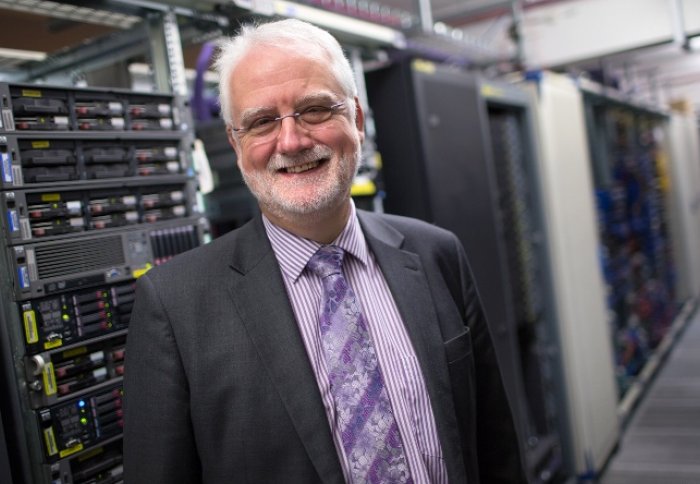

Professor Chris Hankin, Director of the Institute for Security Science and Technology, looks back over 30 years at Imperial College.
Do you remember those early days at Imperial?
Not particularly clearly I must admit! Before I came to Imperial I was a computing lecturer at Westfield College in West Hampstead which was a Constituent College of the University of London. It was in the process of merging with Queen Mary University and different Departments were being hived off, so things were quite turbulent and so it was nice to pitch up here at Imperial where things were much more stable.
I’ve noticed computing professors often like to reminisce about ‘how it used to be’. Do you ever look back?
Indeed, it’s a field that moves particularly quickly. Back then there was no world wide web, very limited email and I specifically remember writing a book at the time with some colleagues that I had to get typeset at the University of London Computer Centre which seems terribly archaic now. I’ve seen things change, notably with Imperial’s own web presence. I worked closely with Tom Miller, then Director of Communications, several years ago in moving toward a content management allowing more people to edit content on the website. I’m now on the project board for the latest College-wide website re-design due in December, which is very exciting and geared towards the revolution in mobile computing.
You’ve been in many roles at College, can you talk us through some of the highlights?

Chris with ISST colleagues
I was Deputy Head of Computing for almost 10 years, so I have an enduring interest in the Department even though I have to split my time between Computing and the Institute these days. A major juncture was being elected as Dean of City and Guilds College in 2000, which has become an important ongoing part of my activity here at Imperial. Through that I got involved with the wider City and Guilds of London Institute which trains some two million people every year worldwide at various different vocational levels. Between 2010 and 2012 I served as President of The City and Guilds College Association and became involved in the very active and vibrant Alumni Association of City and Guilds.
Tell us a little about the Dean role, which is essentially that of Consul now. It’s sometimes said the office serves as the conscience of the College.
I’m not sure who coined that phrase, but it was around even back then. What the Deans were about, and still about as Consuls, is quality assurance. For example I chaired the Engineering Studies Committee and was involved in the Postgraduate Education Committee which was eventually replaced by the Graduate School. Deans were also able to present an independent view to management when required. Bruce Sayers, former Head of Computing, was something of mentor for me - he was always having stand-offs with the board of studies and the then Rector Sir Eric Ash.
For me personally it was a nice way of getting a broad overview of staff across College, as you are very much involved in appointments and promotions. As a more junior staff member when I first joined, there was a tendency to sit very much within your own Department and not really see what was going on even in the Department immediately adjacent to you.
Your role as Pro-Rector (2004 to 2006) brought you right into the heart of College strategy
That’s right. I very much enjoyed being part of a team working with the then Rector Sir Richard Sykes and Deputy Rector Sir Leszek Borysiewicz. I think one of our major achievements from that time was the development of the first articulation of a College-wide research strategy - remnants of which are still visible in today’s strategy. One of the things that came out of that was the creation of the multidisciplinary research institutes, and fortuitously I’m now a direct beneficiary as Director of the Institute for Security Science and Technology! Another success was in attracting funding for the RCUK academic fellowship scheme; we ended up with 31 academic fellows most of whom have stayed on at the College as lecturers, some of whom are also Professors. That whole scheme gave the inspiration for the Junior Research Fellows spearheaded by Professor Maggie Dallman. Both schemes have been important in bringing through new talent.
And then it was back to Engineering for you
I spent two years as Deputy Principal of the Faculty of Engineering, working with Professor Dame Julia Higgins and Professor John Wood. It was a nice period of time, because Engineering was really growing in terms of its research activities, which continued under Professor Stephen Richardson and now Professor Jeff Magee. I was given a lot of latitude in the amount of responsibility I was able to take on. I see that as my first real management role because Pro-Rector, while very interesting, didn’t have any resources other than those that I brought in, while the Deans are purely advisory. I then moved back into the Department of Computing as a full time professor during Sir Roy Anderson’s sojourn as Rector, which was also the time that Sir Keith O’Nions came in to set up The Institute for Security Science and Technology (ISST). The rest is more familiar recent history, Sir Keith of course went on to become President & Rector and invited me to take on the Directorship of the Institute.
How has your Directorship of the Institute been?
It’s been an incredibly exciting time, an opportunity, towards the end of my career I guess, to find real applications for some of the ideas I’ve been working on as a theoretical computer scientist for the previous 25 years. Suddenly I’ve found lots of really interesting problems, related to different areas of science and technology, aided by the relationships I’ve established with staff across College in my previous roles.
What is your research focus?
Throughout my career I’ve been interested in programming languages, in particular understanding what programs do from a mathematical point of view and then using that knowledge to make them run faster or more recently to understand their behaviour from the point of view of security. I moved into what these days would be described as cyber security in the mid-1990s. Most of my research is under that banner.
How has the ISST evolved?
 We’ve done a lot of work on data analysis to support major investigations into criminal activities, and we’re one of the government’s academic centres of excellence for cyber security research in the UK. The ISST has also been involved in the creation of three new research institutes - The Research Institute in the Science of Cyber Security; The Research Institute in Automated Program Analysis and Verification and the Research Institute into Trustworthy Industrial Control Systems, which I am Director of.
We’ve done a lot of work on data analysis to support major investigations into criminal activities, and we’re one of the government’s academic centres of excellence for cyber security research in the UK. The ISST has also been involved in the creation of three new research institutes - The Research Institute in the Science of Cyber Security; The Research Institute in Automated Program Analysis and Verification and the Research Institute into Trustworthy Industrial Control Systems, which I am Director of.
What function will that serve?
It’s looking at how we might protect against and mitigate cyber threats to the infrastructure that controls a range of processes including nuclear power generation, manufacturing, energy distribution and the national rail network. The threat has arisen because, while industrial control systems used to be bespoke and isolated, they’re now increasingly using off the shelf components, which are essentially full powered computing elements. These can be and often are connected to the internet because that makes maintenance easy, but at the same time it makes them vulnerable to the same kind of cyber threat as desktop machines.
Is there wider societal issue here as well – many of us want more efficient, connected technology but it come at a price in terms of privacy, does it not?
We’re probably stumbling through this debate at the moment, but interestingly I recently attended a meeting discussing whether we need a new social contract, governing the way government and industry deal with our data. We perhaps shouldn’t have been all that surprised the NSA was collecting our data but many people felt betrayed and maybe the real issue is transparency. We need to better define the responsibility that government/industry and individuals have to each other as technology inevitably marches on.
Lastly, the College is heading into bold new frontiers with the Imperial West Campus, something you’re involved with?
That’s right, I actually have a hot desk at Imperial West already as the College’s Principal Investigator on the European Institute of Innovation and Technology ICT-labs, known as the London Node. It’s one of the first initiatives at Imperial West and seeks to bridge the gap between research and the commercial delivery of innovative products and services. The Campus as a whole though is an incredibly exciting development, with initiatives like the new Michael Uren Biomedical Engineering Research Hub; although I’m unlikely to see it reach its full potential because it’s probably a 30 to 40 year project. But that’s exactly the sort of long term thinking we need for the College and the economy as a whole.
Article text (excluding photos or graphics) available under an Attribution-NonCommercial-ShareAlike Creative Commons license.
Photos and graphics subject to third party copyright used with permission or © Imperial College London.
Reporter
Andrew Czyzewski
Communications Division

Contact details
Email: press.office@imperial.ac.uk
Show all stories by this author




Leave a comment
Your comment may be published, displaying your name as you provide it, unless you request otherwise. Your contact details will never be published.